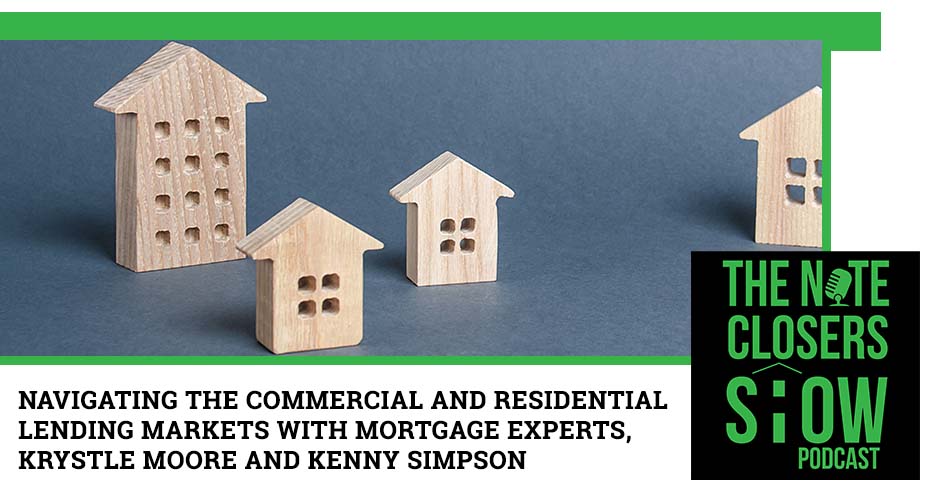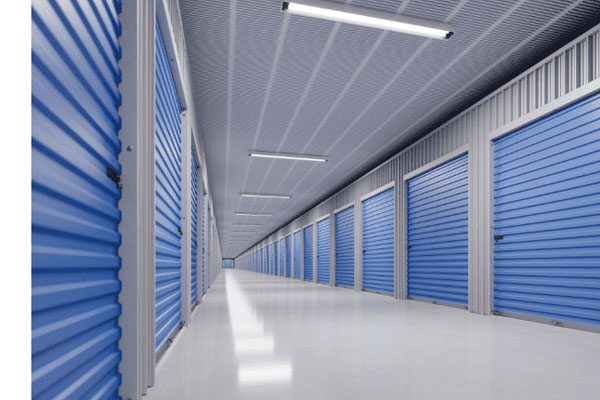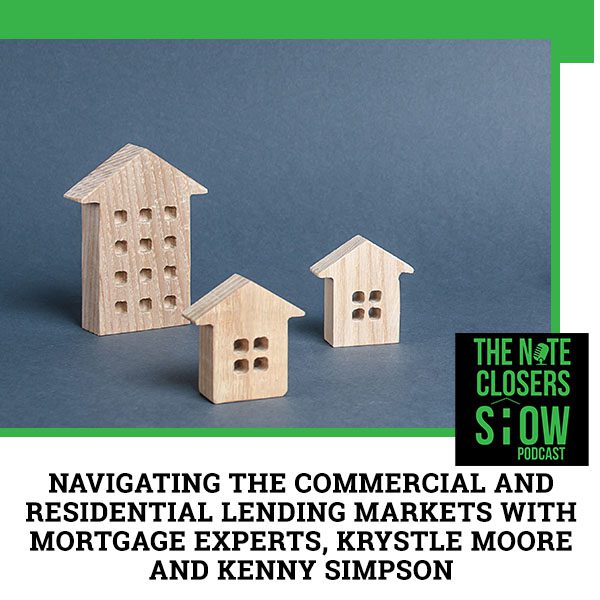
We see so many changes in the mortgage markets that it can be tough to keep up. Fortunately, Scott Carson has not only one but two guests who can provide us with a great view of the residential and commercial lending markets. On this episode, Scott interviews Krystle Moore and Kenny Simpson from the Get In the Cashflow Game podcast. They are both lending experts with more than nineteen years of lending experience. Krystle and Kenny share their insights into the current mortgage markets, where they think the market is heading, and where opportunities lie for investors in and outside of the southern California markets. With this crazy market we’re currently in, you better tune in to this conversation and gain insights to navigate and thrive through the changes!
—
Watch the episode here
Listen to the podcast here
Navigating The Commercial And Residential Lending Markets With Mortgage Experts, Krystle Moore And Kenny Simpson
Welcome to the show. We have got a twofer for you. No episode is more relevant with the craziness in the real estate markets, specifically the mortgage markets. We’ve got some of the best of the best when it comes to residential and commercial finance here on the show. I’m excited to have Krystle Moore. She is the founder of Pacific Shore Capital and San Diego’s leading expert in commercial financing and real estate investing. She’s been in the crew for several years.
An opposite of her, we’ve got Kenny Simpson. He’s the Head of the Simpson Team at San Diego’s premier residential financier and real estate investor. He’s worked with over 1,000 clients on all sorts of stuff. I got two experts that have their thumbs on the pulse of the craziness of the market. We are so honored to have you, Kenny, and Krystle, K&K. We have a double barrel of financial questions for you. Welcome to the show.
Thanks for having us.
Thanks for having us. I appreciate it.
It’s a crazy market at the rates we are going through. Let’s talk about some of the changes that you guys have seen because it used to be, “Cheap interest rates.” I won’t say it will make fog in the mirror. It wasn’t like it was back several years ago, but let’s talk about it. Let’s do the commercial market first. Krystle, let’s talk with you about how that’s changed in the last few days.
It’s interesting because most of our commercial rates haven’t changed much over the last few years. A lot of our lenders are banks in Southern California. We have good financing, so we’re not doing a lot of agency debt. Our lenders change rates maybe once a week. Some didn’t even change for two years and now it’s daily or sometimes multiple times a day. It’s been super volatile in terms of rates.
We’re seeing things like rates going up even as treasuries are going down. Lenders are increasing their spreads. That’s a big question I’m getting all the time from clients. “The treasury dropped. Did my rates go down?” “No. In fact, they went up a little.” That’s what I’m seeing right now in the market and it’s causing a lot of price negotiations on deals that are already in escrow. People are backing out. Some sellers are realistic, other ones aren’t. There’s been a lot more change than we’ve been used to over the last few years.
Most folks haven’t ever taken out a commercial loan. It’s a different process than a residential loan, right?
Yes.
You’re looking heavily at the cashflows and credit, which is always a big thing, but what are some things you’re looking at on the commercial side for a good borrower can qualify?
I always say my business is so much easier. When you get a commercial loan, we’re assuming that you’re a savvy business person. These are technically business loans. The key three things that I ask for when I’m qualifying someone is I’ll have them give me their personal financial statement and their real estate schedule, but I’m going to look at what’s their net worth.
Their net worth needs to be at least equal to the loan amount or greater. I then look at post-close liquidity. After your down payment and closing costs, most of us lenders want to see about 10% to 15% of the loan amount in liquidity. If you come to me for a $1 million loan, you need to have about $100,000 to 150,000 of cash or cash equivalent. That does not include your retirement most time. If you have some mitigating factors, I like to say that we’re common-sense lenders, not so much like residential.
Honestly, credit-wise, we don’t even have like a minimum FICO. For residential, you might have a different rate if you have a 720 or 740 score. We don’t look at that. Again, we use our common sense. Some of our real estate investors are super active and they might have a tenant eviction or thing on their credit that’s giving them a ding or some little thing here or there. We look at your credit. The overall creditworthiness is more determined by what your credit looks like, not a number on a page. That’s mainly what we look for in terms of qualifying.

Mortgage Markets: The overall creditworthiness is more determined by what your credit looks like, not just a number on a page.
When you’re looking at the asset, you’re looking at all cashflow. You’re looking for 1.25% in debt service coverage?
For multifamily, it’s 1.15% to 1.2%. If you’re going commercial, like office, retail or industrial, it’s usually like 1.25% to 1.3%. That’s the biggest crossover that people need to make when they’re trying to go from residential to commercials. They call me and they go like, “What LTV can I get?” I’m like, “You can get 75%, but if you’re in Southern California, good luck.” This is all debt coverage constrained for the most part.
I tell people, “The lower the cap rate, the more money you have to put down. If you want to buy by the beach at like a 3% cap, you’re probably putting 60% down.” That’s all it cashflows for. The good news is the bank’s not going to let you fail because they’re making sure that the property covers the debt. They’re buffering it with vacancy factors and management fees even if you self-manage and replacement reserves. They have all these little buffers to make sure that you’re safe, which is not something that you get with a residential loan.
I want to come back to that point where you said, if you’ve got great credit and a lot of stuff, you could get 70% to 75%, but banks usually want to be in the 60s of value or less, correct?
It’s all debt coverage constrained. It’s interesting, though, because we’re part of some groups that invest nationally and we also lend in other states, so some of these other Midwestern states and things like that used to be able to get 80% LTV all day long, but cap rates are compressed everywhere. We’re seeing 60% to 65% loan to value as all anything’s qualifying for these days.
It’s such a direct relationship when your rents go down or the interest rates go up or cap rates go down and reduces the value of the property, and that’s where the banks don’t want to be leveraged. We see that a lot with the debt that we’re looking at. They may have been at 70% to 75%, but with the vacancy and things like that, now they let the borrower come to the table with 10% cash or 20% to write down that loan to stay at that percentage. I don’t know if you’re seeing a lot of that with any of the loans that you’ve done in the past few years or heard about any of that.
It’s mainly flippers and syndicators because they’re doing all these bridge loans and stuff like that, which have been very popular. We’ve done a ton of them. That market is not that attractive anymore. You can put a little extra money down and get a much better rate nowadays. I’m seeing those guys doing more like a three-year fix type of deal and that’s your bridge financing now, but those guys are having to come in with cash because they get good reputations. They’re super active and then have these private money lenders that are lending them 80% to 90% loan to value and then they go to refi and can’t qualify or the lender wants seasoning, which is whole other thing lenders are looking for.
If you bought a property several months ago, you can’t get new value even if you’ve increased the value to 50% or something. They might say, “We want you to keep some skin in the game, so we’re willing to lend you 85% of your cost plus any renovations you’ve done,” so that’s when we see people having to come in with extra cash.
Let’s flip it over to the crazy world of residential stuff there for you.
Hold on tight.
It’s much more of a rollercoaster a little bit for both sides, residential and commercial, but what do you see on the rates, mortgages, and cancellations? Is it as bad as social media and the media portraying it these days?
I did read that statistic about the cancellations. That’s just the psyche of the buyer. The problem is a lot of us are learning if we don’t understand how markets and money work, what inflation means, and how fast things can go up and down. We realize what that means to the stock market, crypto market, the housing market, or all this stuff. I tell people we have the R-word, recession. I said, “Everything lags.” I feel like when rates went up, we feel it in our business because it’s affecting us right now, but a lot of people, the general public, might not feel it. Now, you’re starting to see the effect right now because they didn’t go up yesterday. They went up months ago. We’re starting to feel that effect.
I explain it now because we’re going to ask this question. Lower rates or give money to people, it’s money in the system and money out of the system and they are yanking money out of the system and nobody’s getting the free hamburgers, rents, or massages, whatever everyone is saying, it’s over. You got to pay your bills and then they’re raising rates.
I told Krystle, “2022 is going to be a challenging year,” because I knew this was going to come, but nobody predicted this high. We do month-over-month webinars at the beginning of the year. It was the NAR that predicted the highest at a 4% rate by the end of the year. We hit that in the second month of 2022. I’m not seeing the cancellations here, but I’m hearing about them all over. A lot of them, too, might be at the builder level, where people are like, “I’m out.” What I am hearing is a lot of people saying, “I’m not going to do this remodel. I’m not going to buy this.” I’m starting to hear a lot of things in life where people are like, “I’m going to wait.”
I can imagine if the biggest thing you’re going to purchase is a house, you might wait and see. As anything, in the refi market, you’re only going to refi if you have to. It’s pretty much a divorce, a breakup, a death, a get a partner out, or you’re like, “I’m going to go get some capital out, so I’m going to pay a higher rate, but I’ll refi when it’s lower to deploy that capital and make money on it,” but otherwise it’s pretty much all purchased business.
I don’t know if it’s like now until when they announce QE, but it’s becoming a buyer’s market. If a house is listed for $500,000, used to pay $550,000 and have a wrestling match to get there, now it’s $500,000 and I’m going to offer you $480,000 and I want seller credit. That’s what we’re seeing. That’s the difference.

Mortgage Markets: It’s becoming a buyer’s market.
That’s what I was going to ask you because San Diego has been famous for having this disclosure in the listings that appraised value will not dictate the final sales price. You have to bring $25,000, $50,000, or $100,000 to win the bid and that’s cash out of pocket in a lot of cases. We’ve seen that here in Austin a lot with a lot of California folks cashing out and moving to Texas, buying 3 times the size of the house for 1/3 of the costs. We call it Austin is California East.
That’s what I heard. It’s like San Diego in Texas.
It’s funny because there’s an article. I don’t know if it’s the real deal or whatever. They’re saying there are so many people who went in there and overpaid. They’re expecting a bigger correction. I tell people it’s because somebody went in and the house was listed for $2 million and they’re like, “Look at what you get. This is a deal. I’ll give you $2.8 million. They don’t even care. They came from California with all this money.” You know what you’re living there.
We’ve seen our house skyrocket from 35% to 40% in the last few years. It appreciated. I’m like, “This is stupid.” You both have been around in lending since before the last time. 6% interest rates, that’s pretty good compared to where it was before 2007 and stuff like that. When you think about this stuff, people are all flipping out. “It’s not 2%. It’s 4%like you said.” That’s still cheap money when you figure out how everything works out.
It’s still cheap. I remember 2005 or 2006 when I was doing 6.5% loans all day and those were good rates. We got used to things being pretty much free for the last few years. It feels expensive.
The first loan I did was for my parents and they had like 11.5% or 12% back in early 2001. I was like, “You haven’t refinanced yet. Let’s do cash out. We got equity. Let’s everything in there and save you $1 million on there.” This will probably be a little bit different, Kenny and Krystle. You probably see this more in specific asset classes like apartments, self-storage, or things like that. Are you seeing any portfolio lenders with different requirements than what your true brick-and-mortar bank is offering these days?
We’ve got a couple of relationship-type banks that will do a lot more for you. If you’re a very well-established owner and you’ve got deposits with them. They’ll still do more for you. It’s probably more conservative than it was. That’s one of the things I love about Southern California. In Southern California, we’re like a small business relationship-type community. If you have a good track record, you’re going to get better terms from a private bank. If they understand your story, believe in you, and know your track record, you’re going to get something more than somebody off the street or somebody buying their first deal.
Kenny, on the opposite side with you, are you seeing a lot of non-QM or non-prime loans? They got rid of subprime loans, but we all know they’ve been around there for you. Have you seen a lot of changes that take place and a lot of lenders tightening up their product packages for that stuff?
I don’t think they even have to do that because the rates are so high. I am funding a deal right now and Krystle knows the deal. It should have been a non-QM. He got his screening rate. It was better for him to go with private money. This is what’s going on in this industry. The banks are here. They get to hold the paper. They put it on the balance sheet and sell it at a later time. For us, you got the Fannie and Freddie, and those rates that come down a little bit, but then the non-QM space primarily everybody takes it and sells it on the secondary market. When rates are taking up Fannie and Freddie, there was this little gap between non-QM.
I remember going to Krystle and saying, “How are you guys so close to Fannie and Freddy? If you’re going to buy a note, “I’d rather buy the full doc than this thing if it’s this close.” When rates came at Fannie quick, the non-QM was like, I don’t know if they’re sleeping or on vacation, but they let it sit there for a couple of weeks and all of a sudden, somebody went out to the market to sell like bought and sell $100 million. They went there and everybody’s like, “We’re not buying this.” There are no buyers and that sends shock waves. The rates went like 2% within a month. It killed everything. The high rates with non-QM are killing it because it’s making it hard to qualify.
They’re starting to accept vacation rental income. If you’ve bought a property before, “We don’t care. We want to see a history.” Now, they’re like, “There’s a lot of people coming for vacation rental. If you can go get a rent survey on the property to show vacation rental, they’ll use that,” but what we’re seeing for me, we’re lucky that we’re a broker and have some good relationships with banks that can portfolio the product.
For investment properties, I’m able to do some competitive 2-to-4 financing. That’s arms and stuff. That’s helping clients keep way below market. As I mentioned, we have others like DSCR lenders that are banks and they’re balancing it, so if you qualify, we’re seeing a significant lower in the rate, but otherwise, if they have to sell it, nobody wants to buy cheap paper. I said, “There are no buyers at 6%. They want a 7% or 8% yield. It’s crazy, but until things change, that’s where they’re comfortable.”
That’s pretty much the minimum aspect of it. We want to make it an 8% because it costs us to raise capital to buy that stuff and that’s usually a breakeven point unless it’s a hugely distressed asset that we can pick up at $0.50 cents to the dollar and make our money on the back end. I love the mortgage markets. It’s almost like the general hospital. It’s a soap opera in a lot of cases. I’m going to throw this to you, Krystle. In the future, what area of the clients that you work with are going to be the most impacted in a derogatory fashion?
That’s easy, retail and office. Those are the two spots that we’re already seeing. There’s an opportunity, at least here. In Southern California, there’s no land to build. What are you doing? We’re starting to see more people converting the office into living spaces. It’s such a genius thing to do because we’re notorious for being so difficult to get plans, permits, and build and it’s so expensive. Why not take an existing structure and convert it into a residential one? That’s where the opportunity is, but industrial is super strong. Multifamily is always strong. Office and retail get hit the hardest.

Mortgage Markets: We’re notorious for getting plans, permits, and buildings so difficult. It was so expensive. So why not take an existing structure and convert it into a residential one?
I’d agree with that. Some deals that we were looking at offices, like executive offices, turned into self-storage. It was full of office furniture from other offices that were closing down.
I also think that these class-A apartment buildings or luxury apartment buildings seem fancy and fabulous to own, but they operate at a higher vacancy. You can’t get a two-bedroom here for less than $4,000 a month. What’s going to happen when the economy turns? People aren’t going to be able to afford to stay there. I’d be nervous if I owned some of those luxury buildings.
The big box stores with retail offices, we’ve seen conversions of that to self-storage facilities in a lot of cases.
Self-storage is another super strong sector of real estate. People will pay tons of money to store their stuff that they never look at for years.

Mortgage Markets: Storage is another super strong sector. People will pay tons of money to store stuff they never look at for years.
They walk away from it, and then you sell it all. It’s honestly like an unbelievable business.
With roughly a 30% expense ratio compared to 45% or 55% in multifamily. We’ve got a friend that owns couple thousand units and she doesn’t even have any onsite man. It’s all done like ATMs and virtual these days.
Smart woman.
Where do you think you’re going to see the biggest impact on the residential side for you, Kenny? Is it more of a price range or areas out there? San Diego’s always been hot, but are you going to see more stuff in our areas because people want to live downtown or live in San Diego?
Everybody’s like, “We always go back to where we were scarred.” We were scarred from the ’08. Whether it’s a relationship or this, it’s like, “Remember the time you screwed me over?” When I go back and I look at the data and everybody’s like, “How is it different from then?” If you take San Diego before the last crash, there are 27,000 active listings on the market. Now, we looked and there are 5,000. We’re still lacking inventory. The profile of the borrower, as you know, was the heartbeat and pen loan. You just have to have a heartbeat and pen, and we’ll give you a loan. Now, that’s not the case. We’re making better loans.
The average credit score is much higher. Right now, because of COVID, they’re doing the workouts, but I always tell people I believe banks are working things out more these days. They’re not in the business of foreclosure in the short sale. That was a disaster for them. The other thing that nobody talks about that I believe is when somebody can’t make a payment on their car, this or that, and their credit gets ruined, they’re not a consumer for a year or two. They can’t get credit and spend. Most people buy anything using credit.
We learn from that saying, “Isn’t it better to try to work them out or go sell your house?” One thing they did with the pandemic and it sucks, but they did go back to the banks. It’s like, “We bailed you out. This did help because you would’ve had a nightmare of a situation.” Take 2012. When I was looking at data, the foreclosures and short sales were 35% of the market, but now, it’s 1%.
People have more money and are more prepared and stuff. When I look at the bar and I’m like, “Where is this going to be?” I do think and as you said people went and they bought in out outlining areas and the market was hot and they probably overpaid and you’re like, “Who would buy a house out here for $750,000? There’s nothing here.” Those people will probably get hit first if it goes down and then it trickles in.
Otherwise, it’s going to be a matter of inventory. Are there going to be more on where you guys are? Are you going to get a bunch of inventory? The sellers are like, “I want to try to capture before if there is more of a correction,” or “I want to get out and cash out or move somewhere else.” The third is, “I have to sell because of some situation,” but I see the people that might have gotten hurt that put minimal down that went out in the outlining areas. Hopefully, they locked in on a good 30-year fix.
The thing is that 75% of people have a 4% or less rate and the ARM rates or the ARM products around 2 million to 3 million people have ARMs. Last time there were 13 million or 14 million ARMs. When you look at the data, you’re like, “People are in a better position, ” but if people lose their jobs and stuff, they’re going to walk away, but it’s going to be smaller. Certain markets are going to be worse, but the outlining areas are going to have problems where people went too far out or overpay for a house.
Also, people don’t necessarily want to sell their house to cash out, especially if it’s not a huge cashout. They can’t go anywhere. They can’t go get a lease because they’ve got bad credit. They don’t have the extra to put down. They can’t qualify for 24 to 36 months for a traditional loan after that point. People will say, “They just have to sell their house.” That’s not always the case. They might not have a place to go.
You’re right. As note investors, banks don’t want to end up going the real estate. They would rather sell it off to somebody else and go out and rinse and repeat velocity capital, go out make loans again on that stuff, and that’s fresh, clean paper. Let somebody like me be the bad guy having a foreclose or evict. I don’t mind it because we’re seeing deals 6 to 12 months ahead of when most investors are buying the REOs or the short sales. That’s why you don’t see that much stuff because it’s already been worked out because somebody stepped in and gave the borrowers an opportunity.
Also, towards the end of the last recession, people would always ask me, “How did apartments do?” I’m like, “Honestly, we’re fine.” The rents didn’t go down that much. I saw a lot more people bunking up, like family members living together, somebody sleeping in the living room and two people sharing the bedroom, and all that stuff.
I feel like things get tough here because people are so much smarter and there are so many more things now. You can vacation rent a part of your house. You can get a roommate. As you said, if you locked in a 3% interest rate, you’re like, “I’m stuck here, so now I’m going to be the person in the family who everybody comes to move in with because I got the good rate and I need the cash.” People are a lot more prepared, smarter, got good rates and good loans and they’re going to be stuck, but that’s not the worst-case scenario.
You got a low-interest rate and are stuck right now in a volatile timeframe where you’re still able to afford things versus somebody who’s got an interest rate that’s quite a bit higher, three times higher by the end of the year, or who knows. You’re in a much better position even if you lose out on some of that equity with prices coming down. You’re still sitting in a great position to write it all out. That’s what we love as investors to write stuff out and cashflow as best you can. Let’s talk about your investments and what you like. What lights your fire as an investor? Kenny, what’s your favorite thing to invest in and where?
The bread and butter is multifamily. As Grant Cardone would say, it’s not to get rich quick. It’s to get rich for sure long term. Krystle does the commercial financing, but we know a lot of people over time that built a portfolio that’s not sexy and fun. It’s not shiny and flashy, but it’s consistent. There’s that opportunity. We’ll see what the market presents too. There might be an opportunity to buy some distressed homes or stuff and flip them.
I think crypto and the stock market are very much on sale. We have to see how much carnage there is. The Feds will hike one more time and then we’ll have the recession. There’s going to be a lot of opportunity if you have the cash to deploy it in the next months and make a lot of money before they hit the QE button and we’re going to be right back where we were.
Krystle, what about you?
I have had the privilege of looking at a lot of very successful people’s tax returns and I always joke that like apartment investors look like they should be living under a bridge somewhere because, somehow, they don’t have any money on their tax returns, it looked like. I saw their lifestyle and how they live. Multifamily has always been my bread and butter. As Kenny mentioned, we shift within that industry. Flips, rehabs, renovations, or all the rage, we were doing that when it was hot and it was super safe. We were doing that and trading up to build our portfolio.
In Southern California right now, ADUs are the big thing. On multifamily, you can add multiple. We look at those as opportunities for us to add units to our buildings with fairly low building costs and not as much red tape and all of that. Within the industry, we look at where we can maximize because multifamily used to be more profitable, but now it’s become the super safe vehicle.
The safer you are, the lower your return is. We have to get more creative to increase our returns by adding ADUs through renovating or adding other streams of income and cutting expenses. That’s what I love to do. Kenny dabbles in the stock market and it’s not my thing. We’ve invested in some other businesses through some of the other groups that he does, but the majority of our investments are multifamily. That’s where it’s safe and I’m never going to lose. I feel super comfortable and very confident in that space.
Are you guys buying in San Diego or are you looking at other parts of the country?
We started looking about a few years ago out of state because I was looking for higher returns. Maybe if I was from a small town and I knew some niche space like I looked in Florida and Texas. We went to Florida for a month and I drove every single listing up and down like the East Coast and most of the West Coast. I found that the cap rates were super compressed. I was like, “I can invest in my backyard if I have a bad management company or something. I can take the property back. I can search for other people. It’s so much easier for me.”
The one thing that I’ve learned is as much as people who are out of state say, “Stay away from California. It’s not landlord-friendly. It takes forever for you to get a tenant. You’ll lose all your money.” That is not the case. We have a much higher appreciation than most major metros and areas. Our appreciation alone is huge compared to investing out of state. If you do it right, you can get good returns. Some of the investment groups I’m part of are always shocked I’m getting a 9% return on a property we bought a few years ago. I’m like, “It’s possible.” I love Southern California.
What would you say your average unit number is on the stuff that you’re buying?
It’s 15 to 30 units because it’s gotten more expensive. What we learned is we went to these states, we were talking to brokers, “How many offers? Who’s the buyer?” What we learned is they’re like, “The buyers are international or all over the state. You’re like, “What?” They’re like, “Who are your buyers there?” I’m like, “If there’s a listing, we can probably tell you who’s going to buy it here because we don’t have the outside competition, so we’re shielded here and we talk to these syndicators and interview them.” They’re like, “I might stay there too. I might do the same thing.” If it’s not broken, don’t fix it.
Here, on a super competitive deal like the last few years when it’s been hot, you might have 8 to 10 offers on a deal, whereas out of state, I was hearing like 30, 40, or 50 offers.
You’ve got a strong niche. I always say, “Everybody chasing 100-plus unit developments.” Small target works and you’ve got a ton of them in San Diego there. One of my first note deals was buying an 8-unit and a 21-unit note deal off of Mansfield. It’s on the North side of San Diego.
In North County.
Yes. You have streets of that 8 units, 12 units, and 15 units and stuff like that. They cashflow great. You’re going to have a higher return on that stuff. It’s also great because you can often have one management person manage multiple assets for you in a lot of cases too.
I would love to buy any apartment note here in San Diego because you’re not going to lose, no matter what. Not even a chance.
We were buying debt at $0.50 on the dollar with equity. There was still equity above that back in the day. A lot of these apartment investors out there are chasing those 100 or 200 units. Their biggest goal is to refinance in 24 to 36 months.
Yes.
I don’t think those loan programs are going to be around as they’re expecting. What do you think, Krystle?
No. That’s what I’m seeing a lot with syndicators. It’s a thing I joke about now, “Everyone’s a syndicator.” You’re going to a real estate broker to buy your apartment building and he’s a syndicator. The problem is all these guys are giving these forecasts to their investors like, “Within 3 to 5 years, you’re going to get all your money back through a refi.” I’m like, “I don’t know that that’s going to be the case right now.” Also, with rates going up, it’s interesting. It’s hard for me to fathom where rates are going and then where cap rates might be. Now, it’s a 4.75% rate, but cap rates are still at 3.5%.
Rates are going to go up to 5%, 6%, or 6.5%. Are our cap rates going to go that high? There’s too big of a spread. I’m like, “How are you pitching this to your investor?” As an owner, I’m happy to get a 6% to 8% return and somehow, you’re going to give them an 8% return and 100% of their cash back and 3 to 5 years and you’re going to take a 20% split. How is this all going to work out?
You’re speaking my language. I’m like, “You can wish on one hand and have it happen on the other.” It can happen there for a lot of folks because history does repeat itself in a lot of cases. We’ve talked about some of the different opportunities and by conversion of some stuff there. San Diego is such a unique market compared to other areas out there too.
Growth has exploded in San Diego, too, in a lot of cases out there. What outlying areas do you think are maybe not the overlooked diamonds in the rough? Oceanside used to be the sleepy little mobile home community a few years back. Now, it’s different. What areas do you see a lot of opportunities for those out of Southern California to invest in folks?
I can tell you we love National City here and in San Diego. It’s interesting because I was talking to somebody about this the other day. In the last recession, Chase, who’s the big apartment lender here, stopped doing apartment loans in National City because that was the only part of San Diego where they took back any properties. Now, National City is the next up-and-coming area. You have a lot of owners who’ve never sold their properties. Property taxes are super low. The city’s trying to increase that and they want to encourage building their very easy to work with.
I love National City, but there are a lot of outlying areas like Ramona where you can get the highest cap rate. We’re doing a few deals over there right now. I saw a 5.5% cap in Ramona. I’m like, “You can get a 5%-plus cap anywhere in San Diego.” That’s fabulous. You still have high occupancy and all the good things that you get in San Diego, but it’s a little out there.
In San Diego, we say we have the four walls, Pendleton to the North, the ocean to the West, Mexico to the South, and the mountains to the East. We’re locked in here. Krystle nailed it. The core areas are expensive, but if you can get deals, there’s a lot of upside opportunity. People that love Southern California stick here and regurgitate their money here or something. They love it. Somebody’s been here for 20, 30, or 40 years investing, with the amount of appreciation you said they made. They’re not going anywhere.
Some of them have dabbled outside. They’re like, “I’m not doing that again. It didn’t work,” but I would piggyback on Krystle, I agree those areas, but also there are whole 7 to 8 corridors where there’s Oceanside, Vista, and Escondido. A lot of young families move out there because the bang for your buck is better.
The closer you get to the water, it’s like, “Forget about it,” but if you can buy a deal and get licensed and do vacational or something, you could do well, but it’s tougher by the water. We have clients buying there because they have a lot of money and they’re selling out stuff where they don’t want to be anymore. They’re like, “This is legacy assets for my kids. I don’t even need the money. Let’s deploy it and buy near the beach.”

Mortgage Markets: If you can buy a deal, get licensed, and do something vocational you could do well, but it’s tougher by the water.
Also, the thing with San Diego, too, the biggest comparison is it’s still a pretty good deal here even though it’s so expensive. People coming from San Francisco and LA they’re getting a ton of bang for their buck here in San Diego and they love it. The weather’s better. There’s not as much traffic and all that stuff. It’s a lot more laid back. People here come to work in board shorts and flip-flops. This is a very chill place and it’s very affordable by California standards.
It is.
You may or may not know this. We saw a lot of places they kept one wall up. It was a rehab, not a new build.
We still do because Coastal Commission is rough. We’re in like La Jolla area and they’re saying it’s like three or four years and don’t even think about it if you’re going to build a house.
If you want to build ADU there, everybody gives their two cents. They put the restaurants out there and it makes sense, but we’re waiting for the coastal commission to give us approval and it takes a year. As Krystle says, building in our neighborhood like that one guy that’s been building a house for ten years. He bought two homes. I looked it up and go, “This is an exaggeration.” They’re like, “No, he bought them in 2010. It’s 2022.” It’s a monstrosity, but he’s building it or it’s a 4 or 5-year project.
That’s probably the fastest.
Even if you wanted, you couldn’t build here. She sat on a panel with a lady that does $500 million of building multifamily and stuff throughout California. She goes, “We do $2 billion and you can’t do it here. It’s a joke. We’re the best at it and we can’t even move fast.” It’s good for owning apartments because there is always rent demand, but it’s bad because rents are high, it’s too much.
That makes a lot of sense there for you. Krystle, are you seeing on a lot of your commercial loans where they’re allowing assumable debt to take place where the loan can be assumed to somebody later on for the most part?
The majority of our loans are assumable and honestly, it’s never been a thing. I very rarely see assumptions, but we’re going to see more of them because people are locking in good rates and that’s probably the best debt they’re going to get. Right now, assumptions are going to be very valuable for people in buying properties. In the past, it has not been because everything’s like max leverage, and rates are lower.
I have clients that are doing loans right now that think they might be selling their properties soon and they’re like, “I’m going to do the loan with you because if I don’t sell it, they can assume the debt. This is the best debt they’re ever going to get. I’m safe either way. I could sell the property and have them assume, or I can lock in my debt and make sure I’m safe if something happens.”
That makes a lot of sense for folks to take advantage of that stuff there. What would you say the medium home price is roughly there in San Diego right now?
It’s like $1 million.
Between condos and everything, it’s like $860,00, but when it comes to houses, it’s over $1 million.
That’s a whole different qualification. That’s a jumbo loan these days.
Here’s an interesting thing, there’s Fannie Mae and there’s conforming in high balance. The high balance in LA is $950,000. You can put 5% down to $950,000. Here, if you buy a $1 million home, put the 14% or 15% down, and get it if you want. As Krystle said, the great thing about California is our lending. I don’t know if it’s better anywhere else, but I can’t say anywhere. There are so many banks. People love to lend here. They love the property and know the equity. There are so many options. It’s funny because when she goes and talks to people, they’re like doing all Fannie Mae. We’re like, “No, we do bank out here. No yield maintenance or pre-pay. None of that nonsense.”
In other states, it’s like a standard for multifamily to do a 20 or 25-year amortization and here, it’s like 30 years all day long. If you get nothing else, you get the lowest rates here and you get the longest amortization. It helps you out with cash. That’s probably what you need here, unfortunately. That’s why they do it, but you get the most aggressive financing here and the most options.
That’s why we started to see such an increase in the birth of the 40-year amortization for residential, even 50-year. I saw a modified loan for 50 years. I’m like, “What the hell were they thinking?” It takes me back to the origination days of the product that had more impact on the residential markets. They were great. One percent partial interest payments as long as you kept the appreciation side, but the whole dream stopped for so many folks out there when appreciation stopped. We touched on it briefly. Do you see appreciation slowing down anywhere in Southern California?
Appreciation is slowing down. We’re seeing the price reduction, but people also were trying to chase a pipe dream price and that’s why you’re seeing a lot of cuts where people are like, “If it’s priced right, you don’t need to cut.” It’s people that say, “Mary next door sold it a few months ago for this.” That was a few months ago and it was a random deal. People are starting to accept reality.
The thing that we’ve been talking about that we’re seeing most in purchases is it seems like the 10% haircut to be the thing everybody’s getting from the sellers are going back to the sellers for. Those are going to be comps soon enough. This is going to perpetuate itself. I’m seeing not only some price reductions. You’re not getting the over-list.
Brokers are having the tough job of having that conversation. They sold the seller on what a hot market it is and now it’s like shifted mid-listing, and they have to manage all that. We’re seeing the price reductions are the negotiated price reductions for stuff that’s in contract, but it is happening on new purchases because you know it’s going to keep going because the higher rates go, the less sense every deal’s going to make. When people are calling me for purchases, I’m like, “The next Fed meeting’s like in a couple of weeks. You probably want to lock that in now. Now, it’s not the time to shop around and think about it or wait and see. You got to be ready to move quickly.”

Mortgage Markets: The higher rates, the less sense every deal’s going to make.
On your typical commercial deal, from the time somebody goes into contract, what do you see in closing, 30 or 45 days or is it a long process for you to close in a commercial?
Sixty is pretty much our standard. We are able to close some deals in 30 or 40 days, but generally, we like a 60-day closing. That’s what everyone’s comfortable with. It’s industry-standard here.
Are you seeing 30 to 45 on the residential side in a lot of cases?
No. I rarely get 30. We’re closing as fast as we can. We close deals in 5 to 7 days. We got some great lenders with appraisals, so it’s fast. One thing I was going to mention to your readers too, which could be something we could throw out there, is when people are getting into debt now, if you know there’s going to be a lower rate in the future, which we always probably know because what goes ups going to come down if you’re getting like a DSCR loan, non-QM, and has a prepay, one of the things I’m seeing is this product gets pushed out of a bunch mortgage brokers and lenders as they never did the products.
They’re like, “We got these new products.” Nobody ever asks about the prepay. They don’t talk about it, and don’t understand it. What I would tell people is you have to factor in if you’re buying an investment property or refi-ing something and you think there’s an opportunity to refi in a year or two, make sure you’re paying attention if you’re getting a loan with a prepay.
I’ve had people talk about it. They’re going to get a 5% hard prepay and didn’t understand. It was $100,000 and they can’t refi in two years. It might be worth taking a higher rate and getting a shorter prepay so that windows open. Krystle might want to elaborate on commercials too because even the big guys are buying the big buildings, the syndicators. They’re also figuring out, “We’re going to probably get a discount on the building.” The product’s going to suck the pricing. What can we do and buy down the prepay? We’re already having these conversations like, “What debt can we get? We want to be able to have that opportunity to refi in the future.”
On your side Kenny, it’s interesting. I was telling him this his residential lenders are not very clear about their prepays. Ours are right there on the paper. Everybody knows what it is. It’s a discussion. It’s expected, but for him, “If it says anything, 5%,” and I’m like, “5% of what for 5 years, 10 years, or 20 years? What are we talking about here?”
You have to seek out this information physically, which is probably an area where residential lenders might get in trouble in the future with all these people getting these prepay in their loans and not understanding. It’s standard for us. The biggest thing that we’re doing for clients upfront is talking to the lender, “If rates go down, will you work with me on the prepay if I come back to you? Will you wave half of it? Will you wave all of it and within what period of time?” We know all this stuff up front.
Also, I’m having people shy away. During the last cycle, people freaked out and they all wanted a ten-year fix and thought they were going to keep it forever and rates were never going to go this low ever again. I’m like, “You’re going to regret this decision?” “Nope, I won’t. I know better.” They got these loans. Less than 5 or 6 years later, they’re like, “Krystle, what can I do about this prepay?” I’m like, “You remember that conversation we had like a couple of years ago, that yield maintenance.”
It’s $1 million now. There’s nothing you can do about it.
In a great environment where rates are going down, yield maintenance prepay is the worst thing you can have. I always tell people it’s not about the interest rate. People are so rate-sensitive. It’s like the whole enchilada. You need to take that into account. As an investor, the whole reason we invest is to make money and have some flexibility and stuff.

Mortgage Markets: As an investor, the whole reason we invest is to make money and have some flexibility.
If you’ve never even kept a loan for 10 years, let alone 5 even, let’s not throw it all away now. The worst thing is to make decisions based on fear. People think I’m crazy, but I’m like, “I would still do your five-year fixed.” I don’t think in five years rates are going to be 12% or 14% or whatever that some of these people are pedaling right now.
If they are, there’s a lot of opportunity for us.
Investment properties are meant to be like a fluid. They’re an investment. They’re more fluid and flexible. Very few people have ever kept a mortgage for that long.
I wanted to bring that up because on the residential side, as Krystle said, it’s very uneducated. A lot of people got these DSCR loans and they locked into these long prepays. Nobody pays attention until you need to pay attention. You need to sell and get out. Let’s say you had a 75% LTV and your value went down and then all of a sudden you got to pay this prepay. You might be thinking you’re going to get out this money, but it’s the problem. Pay attention to what you’re signing.
We’ve seen an increase in divorce and people haven’t been forced to live at home with their spouse. Maybe they never should have been. Increase bankruptcies in a lot of cases. FHA loans were at a 14.6% default rate for first-time home buyers a lot of times out there too. It’s crazy out there. First of all, talk about the Get in the Cashflow Game Podcast. You guys are the host of this podcast. You do a great job with it. Share a little bit and a little commercial here for your podcast.
I appreciate it. We started our podcast a few years ago. It was called Value Add with K&K. We got hyper-focused on real estate. We interview entrepreneurs, real estate, and entrepreneurs that probably invest in real estate and stuff. We talk about financing, investing, or we ring different people that could be a real estate attorney or somebody that’s talking about cost segregation.
It’s educating people on what’s going on. We might do solo stuff or we need to update the audience on the stuff we talked about now, rates and mortgages, and how it’s changed. On top of that, I might do a solo where I’m talking about the economy and things like that, and I’ve gotten to dive into that. It’s all the above and trying to educate the clients and help out.
We talk about all things like investments and all get in the cashflow game. We all believe in building cashflow for yourself and all of that. Generational wealth is our big thing. We like helping people to do that. We started out more local. As we’ve grown, we’ve had more well-known guests and people from all over. It’s cool to hear strategy and give people as much information as we can to help them do the same thing we’ve been able to do.
What are your big goals for the rest of the year investment-wise?
We purchased another building. Hopefully, we’ll maybe pick up another one here, but honestly, we’re focused on the industry because a lot of people are pulling back. I’m focusing on more content, building the brand, and continuing to do the podcast. With investment, seeing what the market does and where the opportunity lies. There’s going to be this short window from where rates are high, people are scared, blood in the water, or whatever we call it, the Warren Buffett where everybody else is fearful. Be greedy when they’re greedy. The pendulum is swinging back.
There’ll be an opportunity to where you can buy and get a deal. When the Fed comes in and decides we got lower rates again, they’ll probably lower them low in the beginning to get that stimulus, but then the demand, the people coming off the sidelines, it’s going to be like a herd of cattle running over each other. You don’t want to look back and go, “That was the opportunity.” When you’re uncomfortable, sometimes that is the opportunity.
With so many loan officers and banks laying off mortgage staff and stuff like that, are you getting folks to reach out to you and ask you, “How do you invest?” We know not a lot of loan officers are investing and a lot of realtors are the same way. You still do a great job with building your portfolio and stuff. Are you getting folks to reach out to you like, “What should I do?”
All the time. We always have. We used to have a property management company. I managed over 1,00 units here in San Diego and stuff. It got to the point where clients would be like, “Krystle, do my rehab and let me know how much it costs.” We would do everything from A to Z.
It’s been a long time since we’ve been doing this and people ask us for advice, “How do I get started? What do you think? Do you mind looking at this deal for me? Tell me if you would buy it.” We do a lot of that advisory stuff for our clients. It’s something that we’re passionate about and love. Certain people go hang out with their friends or play baseball or whatever, but we like to look at real estate. We drive properties and go to Home Depot and look at things. That’s what we do.
I don’t think you’re going to meet a loan officer or a real estate agent that is not thinking about investing in real estate and having cashflow. I think it’s discipline. It’s hard to live below your means. It’s hard to sacrifice. The ones that do have an exit at the end of their career. We’ve met people that are the top producers in San Diego for 30 years and made seven figures for the majority of it.
They’re like, “We’re idiots. We didn’t buy.” You’re like, “What?” You think they’re set but they’re like, “No, I’ll be doing this until I die because of my lifestyle and I don’t want to give it up.” We’re surrounded by the crew that does what we do and they’re like, “We need to invest. We get it.” As Krystle said, we’ve seen the lifestyle. You’re like, “Do you want to be slinging loans at 60 or do you want to be chilling out? If you don’t prepare, 60 is going to come like that.”
What’s the best way for our readers to connect with you?
You can go to our website. It’s GetInTheCashFlowGame.com and that pretty much leads to Kenny’s residential site and then my commercial site and then we’re on Instagram, so I’m @KrystleRoseMoore and he’s @KennyBSimpson, but those are the best places to find us.
Thank you so much for coming to the show. This has been a fun episode to pick your brains on where the market’s at and where San Diego is going.
Thanks for having us. I’m excited to do the swap here in a couple of days.
We all have a good time.
I’m excited to learn about what you’re doing.
That’s going to wrap it up. Check out GetInTheCashFlowGame.com to connect with Kenny and Krystle and get your questions answered. Do you do it just in California or outside of California as well?
He’s California and Florida and I can do all states.
I’m getting Texas in. We’re working on getting licensed in Texas.
It used to be you passed your Group 1 and $125 and you were a loan officer back in the day. Not so much anymore, but good stuff. Thanks, guys. I appreciate it.
Thank you.
Thank you.
Important Links
About Krystle Moore and Kenny Simpson
 Krystle Moore is the founder of Pacific Shore Capital and San Diego’s leading expert in Commercial Financing and Real Estate Investing. Krystle has funded over $1B dollars in loans, helping over 1000+ clients with their commercial and multifamily financing needs. Between managing over 1000 units, rehabbing and designing countless properties, she is committed to sharing her immense knowledge and industry expertise with her clients.
Krystle Moore is the founder of Pacific Shore Capital and San Diego’s leading expert in Commercial Financing and Real Estate Investing. Krystle has funded over $1B dollars in loans, helping over 1000+ clients with their commercial and multifamily financing needs. Between managing over 1000 units, rehabbing and designing countless properties, she is committed to sharing her immense knowledge and industry expertise with her clients.
Kenny Simpson, head of The Simpson Team, is San Diego’s premiere Residential Financier and Real Estate Investor. He’s worked with 1000+ of clients on 1-4 unit financing, helping them shift their mindset and have confidence about qualifying for a loan whether for a primary residence or for investment properties.
Want to talk to Scott? Book a call with him HERE
Love the show? Subscribe, rate, review, and share!

